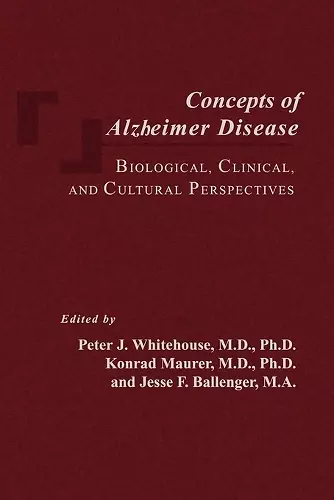Concepts of Alzheimer Disease
Biological, Clinical, and Cultural Perspectives
Konrad Maurer editor Jesse F Ballenger editor Peter J Whitehouse editor
Format:Paperback
Publisher:Johns Hopkins University Press
Published:7th Nov '03
Currently unavailable, and unfortunately no date known when it will be back

This overview of the history and evolution of the concept of Alzheimer disease is a substantial contribution that will interest readers in gerontology, geriatrics, neurology, psychiatry, psychology, social science, and public policy. It is a good introductory book for people new to the field, as well as for clinicians and even for family members of those affected by Alzheimer disease. -- Constantine G. Lyketsos, M.D., The Johns Hopkins University School of Medicine
Essays examine not only the prominent role that biomedical and clinical researchers have played in defining Alzheimer disease, but the ways in which the perspectives of patients, their caregivers, and the broader public have shaped concepts.As the essays in this volume show, conceptualizing dementia has always been a complex process. With contributions from noted professionals in psychiatry, neurology, molecular biology, sociology, history, ethics, and health policy, Concepts of Alzheimer Disease looks at the ways in which Alzheimer disease has been defined in various historical and cultural contexts. The book covers every major development in the field, from the first case described by Alois Alzheimer in 1907 through groundbreaking work on the genetics of the disease. Essays examine not only the prominent role that biomedical and clinical researchers have played in defining Alzheimer disease, but also the ways in which the perspectives of patients, their caregivers, and the broader public have shaped concepts.
The first sentence of this excellent book sums up both its content and the reason one should read it: 'it is ironic that the professional and popular discourse surrounding Alzheimer disease (AD), whose most dreadful feature is the obliteration of memory, proceeds with little awareness of its past.' And if Santayana's often-quoted statement about those who cannot remember the past is true, what does this mean for studies of dementia? This book attempts to answer the question and does so very successfully. -- A. M. Clarfield, M.D. New England Journal of Medicine This book will be an inspiration of greatest interest to anyone engaged in biological or social research in AD. Clinical Gerontologist This is an excellent book, both for the newcomer to the study of Alzheimer disease and to the seasoned reader and clinician. -- A. MacDonald Aging and Mental Health White has written the go-to or standard account of the Haitian Revolution's impact on the United States. Even more important, she has done so in a way that opens up rather than closes off new avenues of exploration. -- Matthew Hale H-Net Reviews 2011
ISBN: 9780801877575
Dimensions: 229mm x 152mm x 21mm
Weight: 544g
344 pages